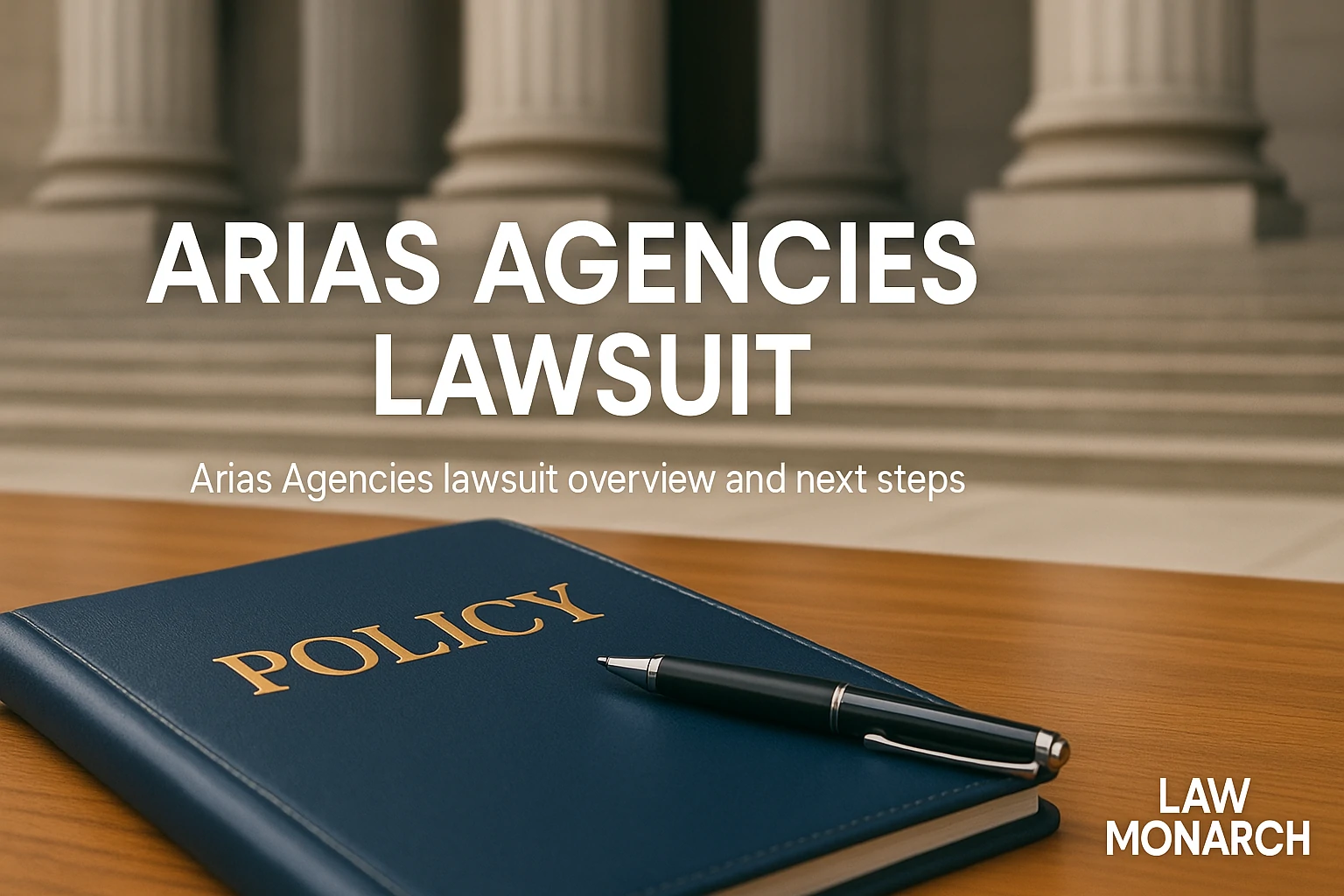Arias Agencies rose fast in the life insurance space and drew wide attention from both new agents and local families. Many recruits saw a straight route to strong income and a clear track to leadership. Households heard a bold promise of safety and steady support through simple policies and direct service. Growth numbers painted a bright picture, and social proof on job boards added to the shine.
Court cases now test that image in a very public way. Former staff describe harsh sales pressure, unpaid hours, and conduct that crossed clear lines set in law and company policy. Several customers report false details on forms and gaps in policy explanations that later caused fear and doubt. State reviews add heat to the story and place records and internal controls under a bright light. Each case raises the same core issue: can buyers and workers trust the process that drove the agency’s rise.
This guide gives a full, clear view of what the lawsuits say, how courts tend to judge claims like these, and what real outcomes may look like in the months ahead. You will see how these claims could touch pay, policy terms, and the path of any future claim for benefits. You will also learn steps that protect your rights right now, so you do not lose ground to missed deadlines or weak records. The focus stays on facts, law, and action that makes a real difference.
Background of Arias Agencies
Arias Agencies sells life insurance across several states and runs a model that depends on large teams, fast recruiting, and bold sales goals. Recruiters speak to ambition and lay out a ladder that appears simple to climb. New agents arrive with high energy and set goals that match the pitch. Many find strong peer support, yet many also feel heavy pressure to close deals and hit targets week after week.
Rapid scale can strain any system that handles money, promises, and personal data. Recruiters may make claims that exceed policy language. Managers may load teams with goals that push people past safe limits. Training may not keep pace with growth in staff count and lead volume. Weak controls at this stage can set the stage for error in forms, pay, and culture. The lawsuits claim that this mix of speed and pressure caused harm to both workers and policyholders.
How the Disputes Began
Claims from former staff appeared first and drew press interest. Workers point to long hours without proper pay, missed meal breaks, and deductions that cut deep into checks without clear math. Several describe a hostile tone on the floor and crude talk that leadership did not stop. Some say they saw pay or role cuts after they raised concerns, which adds a claim of retaliation to the list.
Customer complaints then grew in number and scope. A few policyholders say application forms held wrong data on income or health. Others say they never saw a full and plain outline of limits, waiting periods, or add-on riders that changed the cost. Any false detail can give an insurer grounds to deny a later claim, which raises real fear for families that count on a payout. That fear now drives much of the public focus on the Arias Agencies lawsuit story.
Main Allegations in the Lawsuit
Several cases target sales conduct and the accuracy of life insurance applications. Health facts, income, and job status must match the truth. Errors can kill a claim years later when a family needs help most. Courts look at pattern and intent, not just one stray error. A single slip can be a simple mistake. A long string of errors that push deals across the line can point to a deeper issue with training, oversight, or culture.
Other cases focus on wage and hour rules. Workers say they went past standard hours without proper pay and missed required breaks on heavy sales days. U.S. wage law treats time as a strict right. Time counts. Records matter. States also add rules on meals and rest. Courts compare schedules, device logs, GPS data, chat threads, and time sheets. Gaps can lead to back pay, penalties, and fee awards that add up fast.
A third set of claims centers on harassment and retaliation. Former staff describe crude comments, unwanted contact, and a dismissive tone from leaders after reports. The law bars hostile work settings and punishes retaliation after a good-faith complaint. Evidence can include texts, emails, HR tickets, and notes from peers who saw the events. A clear pattern can lead to damages, policy changes, and outside oversight.
Possible Regulatory Action
State insurance departments can open a review of producer conduct and sales files. Review teams look at training records, complaint logs, lapse rates, replacement forms, and disclosure checklists. They test whether agents gave plain and full summaries of costs, limits, and riders. If they see a pattern of bad data or poor disclosure, they can levy fines, suspend licenses, or order strict remedial steps that last for years.
Labor agencies can audit pay and time records and demand back pay with interest. These actions can move faster than civil cases and often run in parallel. Results can shape how a company hires, trains, pays, and monitors teams across every office. Public orders also send a clear signal to recruits and customers about the strength of controls inside the firm.
How Courts Evaluate These Cases
Judges and juries tend to focus on four core questions that cut through noise. What happened and who knew about it. What documents show and whether they match live testimony. Whether leaders acted after a clear warning or let the issue run. What harm the conduct caused to paychecks, careers, or policy rights. Emails, CRM notes, call logs, HR files, and payroll records tell the story far better than broad claims ever could. Clean timelines win cases. Vague claims lose ground. Credible witnesses and consistent records carry real weight when the court makes its final call.
Possible Outcomes
Many cases end in settlements that resolve parts of the dispute without any admission of fault. Money may go to workers or policyholders who can show harm. Policy language and training rules may change as part of a consent order. Some matters reach trial and lead to higher awards, fee shifts, and strong mandates that reshape pay plans and compliance checks. Public trust then depends on the speed and depth of fixes that leadership makes once the verdict or order lands.
What This Means for Employees
Pay, hours, and respect at work sit at the core of labor law. Those are not perks. Those are rights. If you work or worked at the agency, gather proof now and store it well. Save pay stubs, schedules, chat logs, emails, and any HR ticket you filed. Write a clean timeline with dates, names, places, and direct quotes that you can verify. Note each missed break and any talk about chargebacks or pay cuts. Good notes today will help you months from now when details fade.
Speak with an employment lawyer in your state and ask about wage claims, harassment claims, and strict filing deadlines that can run out fast. Many lawyers offer a free first call and explain likely steps and costs in plain terms. Keep originals in your control and share copies only after you build a full set for your own file. Careful record care protects your case and helps your lawyer aim for the best result.
Impact on Policyholders
Your life policy must match your facts on day one and across every change in your life. Read your application and the full policy packet with care. Confirm your name, address, date of birth, health answers, and riders. Ask the carrier to fix any error in writing and request written proof of the fix. Keep copies in a safe folder that your family can find. Small errors today can turn into claim denials years from now when stakes are high.
Call customer care and request a full policy review from a licensed agent. Ask direct questions about events that void coverage, any waiting periods that could delay a payout, and the medical records the carrier may review. Ask for answers in writing and file them with your policy. Clear paper trails stop disputes before they start and help you get paid when life hits hard.
Related Reading: Affordable Dentures Lawsuit
Steps to Protect Your Rights
Workers do well with a daily log that notes start and stop times and any missed break. Store records in a private cloud folder and back up once each week to a second drive. Avoid secret call records if your state bans that practice. Ask a lawyer before you copy any item the company owns. Smart care keeps you safe as you build your case.
Customers do well with an annual checkup date for the policy file. Update beneficiaries after any life event such as marriage, birth, or divorce. Confirm premiums, due dates, and the billing method. Ask a licensed agent to explain any term that feels vague and add a trusted family member to your contact list. A simple review each year keeps your coverage strong.
Red Flags to Watch
High-pressure talk that skips key details is a warning. Vague pay plans that change with no written notice are another. Sudden commission chargebacks with no math or weak math point to deeper risk. Crude jokes, rude comments, or eye rolls after a complaint suggest a culture that does not respect reports. A strong firm invites hard questions and answers them with documents, not spin.
Signs of Real Compliance Reform
A real fix starts with a public plan that names the issues and sets clear dates. Leadership audits pay and corrects errors with interest. HR rebuilds complaint intake and tracks outcomes. Training covers state rules and ethical sales with tests that matter. Managers cut quota games that reward bad data. Compliance runs random checks each month and shares results. Staff see fast action on reports, and customers get plain forms and short summaries that match policy text. That is the path that restores trust and keeps it.
Media and Public View
Public trust grows when a firm shares facts, sets next steps, and meets every deadline it sets. Trust fades when leadership attacks critics, denies clear issues, or stalls behind vague statements. Courts watch tone and follow-through. Regulators do the same. Recruits and buyers take note and vote with their feet. Cases like the Victoria Bogner Allworth lawsuit show how public perception can shift quickly when allegations gain attention. Clear action and steady proof drive the story more than any press line.
Your Legal Options
Workers can file wage claims, harassment claims, or both, and some states allow group actions when facts line up across a team. A lawyer can assess whether a class route fits the record. Policyholders can file a complaint with the state insurance department and seek refunds or damages if a loss ties back to false data or poor disclosure. Time limits apply in both paths, so set your clock now and move on a clear plan.
Costs and Fees
Many employment and consumer lawyers work on a contingency fee and collect a share only if you win. Ask about costs that can appear during the case, such as expert work, records, or depositions. Get the fee terms in writing and read the agreement twice before you sign. Ask every question you have and expect direct answers in plain words. Clear terms today prevent shocks later.
What Comes Next
Expect more case filings, court orders, and public updates as the docket moves. Discovery will test internal emails, CRM logs, and payroll files. Summary rulings may end some parts. Other parts will head to trial or settle right before a hearing. The company may adjust pay plans, rewrite manuals, and roll out new classes to show progress. Results will land in stages, not in one big moment, and the market will judge each step on its merits.
Practical Checklist
Employees can protect their rights with clean records, strict deadline notes, and calm counsel from a lawyer who knows state law. Avoid public posts about the case and keep your file tight, private, and backed up. Strong prep makes talks and hearings far easier.
Policyholders can protect coverage with a full audit of the policy file, written fixes for errors, up-to-date contacts, and a fresh declarations page after any change. Keep every letter and email in one folder so your family can act fast if a claim arises.
Read more: Justin Billingsley Greene Law
Conclusion
The Arias Agencies lawsuit story tests culture, control, and trust across sales floors and kitchen tables. Courts will weigh records and decide who is right. Workers want fair pay and a safe place to build a career. Families want clear policies that pay when life turns hard. Honest sales, strong training, and strict oversight can meet both goals and rebuild the trust that growth alone cannot buy.
You can act today and protect your position. Save proof, ask direct questions, and write down each step. Seek counsel when your rights feel at risk and keep copies of every record you send or receive. Clear action now can secure your income, your coverage, and your peace of mind in the months ahead.
Disclaimer
This guide shares general information and does not create a lawyer-client bond. Your facts may differ in key ways. A licensed lawyer in your state can review your file and give advice that fits your case.




